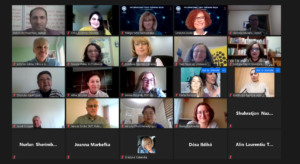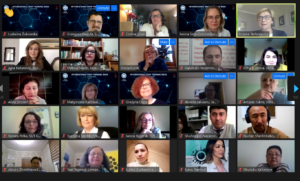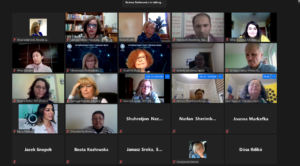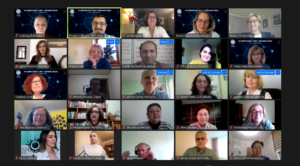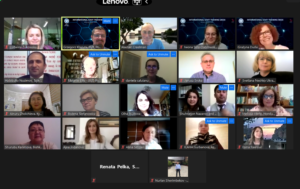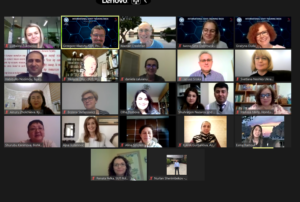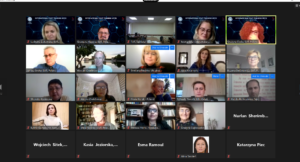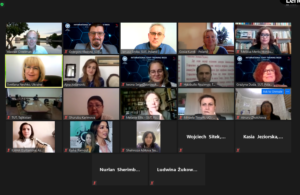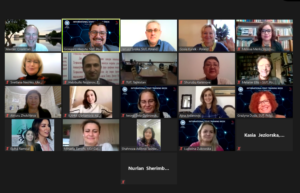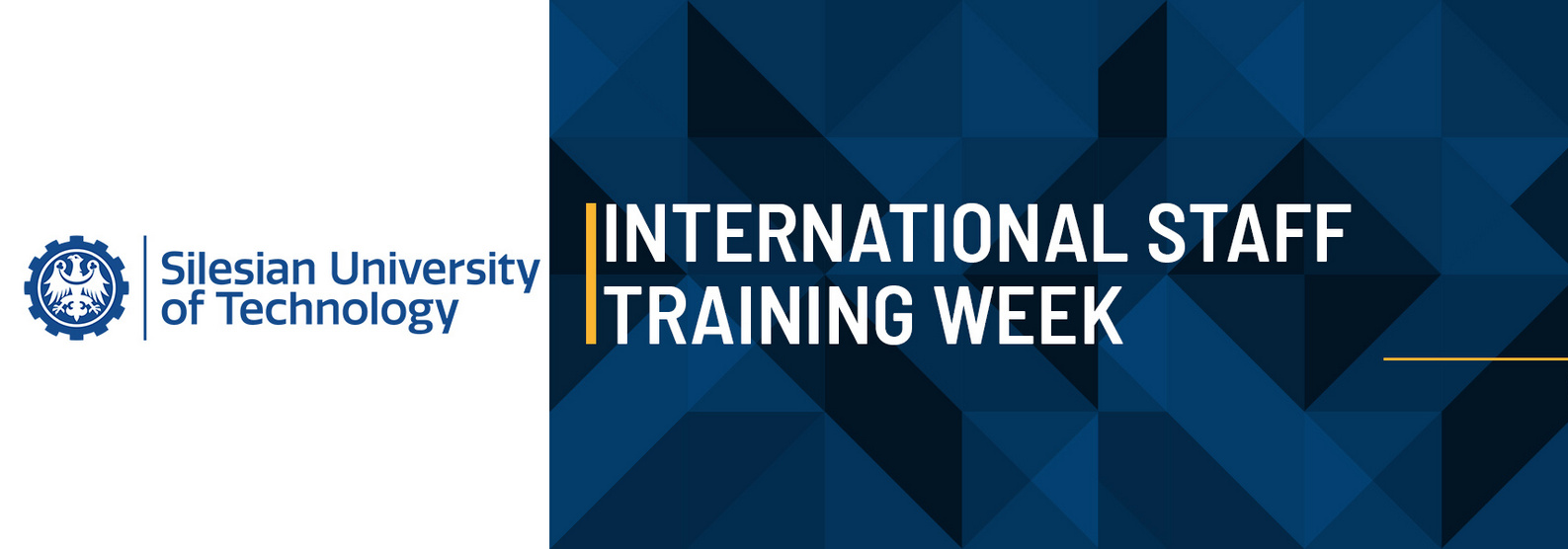
ISTW 2020
| Topic | Internationalisation of Higher Education - Perspectives of International Learning |
| Institution | Silesian University of Technology |
| Country | Poland, Gliwice |
| Date | October 19th-22nd 2020 |
| Guest Speakers |
Dariusz Buchczik, Silesian University of Technology, Poland Alastair Creelman, Linnaeus University, Sweden Melanie Ellis, Silesian University of Technology, Poland Małgorzata Kurek, University of Częstochowa, Poland Barbara Loranc-Paszylk, University of Bielsko-Biała, Poland Yael Tågerud, Linnaeus University, Sweden |
| Full programme |
Full ISTW programme |
| Accomodation | Hotels around SUT |
Silesian University of Technology
International Relations Office
Foreign Languages Centre
Silesian University of Technology International Staff Training Week
“Internationalisation of Higher Education - Perspectives of International Learning”
October 19th – 22nd 2020, Gliwice, POLAND
Dear Partners and Colleagues,
We have the pleasure to invite international relation officers, university educators, professors and lecturers interested in modernising HE programmes to our SUT International Staff Training Week which will be taking place in Gliwice, Poland during October 19 – 22, 2020.
The programme offers workshops, presentations and discussion panels in the following thematic areas:
- integrating Virtual Exchange in university courses,
- developing teaching and assessment methods in telecollaboration and online resources,
- interdisciplinary collaboration between teachers of different subject areas in order to develop students’ competences for employability (PBL),
- good practices in Content and Language Integrated Learning (CLIL),
- development of transferable skills for living and working globally,
- institutional support, initiatives and challenges.
The idea of the SUT International Staff Training Week is to learn from each other, so we encourage all the international participants to present and share their good practices and project results.
The SUT International Staff Training Week includes networking with the faculty and staff of the Silesian University of Technology. The participants will also have the opportunity to discover the SUT campus and explore the region.
Thank you for participation !
With kind regards,
Organising Committee of the SUT International Staff Training Week 2020
mobility@polsl.pl
Presentations and Workshop Materials
Monday, 19 October
Teaching and assessment methods in telecollaboration
and online resources.
10.15–11.15 M2: Community of Inquiry (CoI).
Gosia Kurek, University of Częstochowa
While in the time of pandemia practically all the teachers were forced to go online, few of them could do it fully aware of what it takes to turn an online environment into an educationally efficient one. The answer may come from the Community of Inquiry (COI) model which shows that online learning requires a subtle balance of the three interrelated types of presence, namely cognitive, social and teaching. In this presentation I will demonstrate what a teacher can do to nurture all the three components of COI in an online course.
11.15-12.15 M3: Assessment of the application of skills within an online learning
program: what to do, why and how.
Melanie Ellis, Silesian University of Technology
This interactive session looks at the role of assessment of the application of skills in online courses. We discuss the relationships between curriculum targets, course aims and student outcomes and how assessment acts in this process. The role of peer- and self-assessment is also included. We will think about the challenge of assessing student skills, or the practical application of knowledge, both individually and collaboratively. Assessment criteria, task types and the rating process itself will be considered, together with the all-important role of feedback. Focus will be on the pedagogy- the principles of how- rather than specific technological solutions. I will give examples from my own work with MA students on theoretical subjects in a teacher education program and also from assessment of the practical language skills of undergraduates. Examples include moderation of a discussion forum, problem-based tasks, input-based tasks and student-created tasks. You will share your own ideas, problems and solutions with other participants to produce samples of effective assessment in different contexts.
13.00–14.30 M4: Effective webinars and digital conferences.
Alastair Creelman, Linnaeus University, Sweden
This year has seen a sudden explosion in the number of webinars and online conferences. What tools and methods can be used to make these events more engaging and what solutions can expand the horizons of synchronous online meetings.Workshop with group discussions.
Tuesday, 20 October
Intercultural communication. Development of transferable skills for living and working globally.
8.30–10.00 Tu1: Intercultural communication skills - something for everybody!
Yael Tågerud, Linnaeus University, Sweden
This session is intended to help you gain insights about the dynamics of intercultural encounters. The goal is to strengthen your cultural intelligence and provide you with tools for working in - and benefit from - multicultural and intercultural environments. During this workshop you will get acquainted with key concepts related to intercultural skills and reflect on your own cultural and personal preferences. Hopefully, the session will be meaningful, interesting and fun!
10.15–11.45 Tu2: Intercultural communication - viewing difference as a learning
opportunity.
• Tu2-1: Against the odds - collaboration across cultures.
Iwona Seta-Dąbrowska, Silesian University of Technology; Daniela Caluianu Otaru, University of Commerce, Japan
• Tu2-2: Ups and downs in telecollaboration - how to survive a rollercoaster ride.
Summary of intercultural projects carried out at SUT, FLC.
Bożena Stefanowicz, Silesian University of Technology; Marine Mkrtchyan, Erevan State
University; OlhaTsubova, Lviv Polytechnic; Renata Pelka, Silesian University
of Technology; Corina Löwe, Linnaeus University, Sweden
Virtual exchange projects are a great way to facilitate intercultural communication and learning a foreign language. During our workshop we would like to present the summary of projects carried out at Foreign Languages Centre, SUT showing both numerous benefits and unfavourable odds in intercultural collaboration. We will also give you some guidance how to begin and carry out projects in different cultural backgrounds. We hope to encourage you to start virtual collaboration and convince that sometimes impossible is possible.
12.30–13.30 Tu3: Learning transferable skills through telecollaboration.
Grażyna Duda, Janusz Sroka, Silesian University of Technology; Ildiko Dosa, Budapest Business School, Hungary
The possibility of working and living globally that our students have nowadays, forces us to teach them skills that are transferable to many situations, occupations and cultures. The so-called soft skills, such as teamwork, communication, difficult problem-solving, time management, goal setting and critical thinking are relevant across all professions and help students to adapt to global work situations. In our session we will show how the above skills were learned in practice during past telecollaborative projects carried out between students of SUT, Budapest Business School and University of Grenoble. We would also like you to share with us your experiences in developing students’ transferable skills.
13.30–15.00 Meeting with counterparts.
Wednesday, 21 October
Good practices in Content and Language Integrated Learning (CLIL). Interdisciplinary collaboration between teachers of different subject areas in order to develop students’ competences for employability.
9.00–10.30 W1: Virtual exchanges to enhance Content and Language Intergrated
Learning (CLIL) at the university level.
Barbara Loranc-Paszylk, University of Bielsko-Biała
Virtual exchanges can be implemented with a great deal of flexibility in various learning contexts. The rationale for incorporating virtual exchanges into the CLIL classroom can be found at several levels. This presentation will focus on discussing how virtual exchanges can address the learning outcomes that correspond with the conceptual framework of CLIL, based on the four Cs curriculum, Content, Communication, Cognition and Culture (Coyle, 1999). Futhermore, I will discuss practical examples from the past projects that involved student teachers from two partner universities: the
University of Bielsko-Biala in Poland and the University of León in Spain. In these projects virtual exchanges primarily focused on content learning – that is, on developing expertise in devising teaching materials and constituted a component of a regular university course on Teaching FL skills.
10.45–11.30 W2: CLIL Projects at Silesian University of Technology.
Iwona Seta-Dąbrowska, Małgorzata Gołaszewska, Janusz Sroka, Silesian University
of Technology
CLIL is an effective way of engaging students in motivating and useful learning. We will talk about CLIL programme implemented as part of the English course carried out at the Faculty of Civil Engineering atSUT. During this project students become familiar with tailor-made educational materials which expand their professional vocabulary and subject matter knowledge about concrete and construction processes in order to design and manufacture concrete objects and decorations.The added value of the whole enterprise is that the participants of the project acquire essential transferable skills needed in the 21st-century job market.
12.15–13.45 W3: The year we all went online.
Alastair Creelman, Linneaus University, Sweden
2020 has been dramatic and tragic for people all over the world. In higher education we have seen a sudden and unplanned switch to online education that has presented us all with enormous challenges and opportunities. In this session we will look at how higher education institutions have coped with this change, what lessons we have learned and how this experience may change
education in the future. We will also discuss how your institutions have experienced the crisis and share experience and good practice
Thursday, 22 October
Integrating Virtual Exchange in university courses. Institutional support, initiatives and challenges.
9.00–10.30 Th1: Silesian University of Technology – international cooperation.
Erasmus going digital - SUT perspectives of Erasmus+ Programme.
Grzegorz Kłapyta, Ludwina Żukowska, Silesian University of Technology
Introduction to the Silesian University of Technology. International cooperation- innovation - mobility. Challenges and opportunities for SUT after becoming one of the winners of "Initiative of Excellence - Research University" national competition in 2019.
Erasmus+ programme today and tomorrow. Assumptions and rules for new perspective of Erasmus+ programme - 2021-2027.
10.45–12.15 Th2: New Individual Study Programmes implemented in the form of Project
Based Learning - experiences from the realization of interdisciplinary student projects related to the idea of Industry 4.0.
Dariusz Buchczik, Silesian University of Technology
The Silesian University of Technology has been successfully implementing innovative forms of education in the form of Project Based Learning (PBL) for several years. The concept of new Individual Study Programmes within the project: "Silesian University of Technology as a Centre of Modern Education based on research and innovation" consists in replacing part of the classes with activities involving the implementation of specific interdisciplinary projects related to the idea of Industry 4.0 in small student groups. Education in the form of PBL allows students to be involved in research and development, and allows them to create their innovative thinking. It is possible by engagement of companies and industry experts in the learning process and leads to the development
of new solutions and technologies. During the presentation, the basic assumptions of the program and principles of class organization will be discussed. Obtained experience and results of two completed PBL projects will be presented by their supervisors.
Here you can find presentations and documentation of the ISTW 2020






